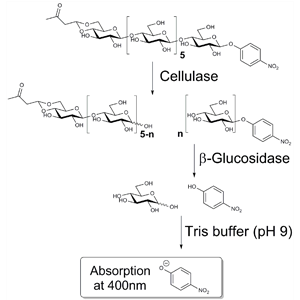商品描述
Content: (K-CellG5-4V)
120 / 240 assays (manual) / 480 assays (auto-analyser) or
(K-CellG5-2V)
60 / 120 assays (manual) / 240 assays (auto-analyser)
Shipping Temperature: Ambient
Storage Temperature: Short term stability: 2-8oC,
Long term stability: See individual component labels
Stability: > 2 years under recommended storage conditions
Analyte: endo-Cellulase
Assay Format: Spectrophotometer, Auto-analyser
Detection Method: Absorbance
Wavelength (nm): 400
Signal Response: Increase
Limit of Detection: 1.2 x 10-3 U/mL
Reproducibility (%): ~ 3%
Total Assay Time: 10 min
Application examples: Fermentation broths, industrial enzyme preparations and biofuels research.
Method recognition: Novel method
Advantages
Very cost effective
All reagents stable for > 4 years
Completely specific for cellulase (endo-1,4-glucanase)
Generally applicable and highly sensitive
Simple format. Well suited to automation
Standard included
The K-CellG5-2V pack size has been discontinued (read more).
Cellulase Activity Assay Kit.
The CellG5 assay reagent for the measurement of endo-cellulase (endo-1,4-β-glucanase) contains two components; 1) 4,6-O-(3-Ketobutylidene)-4-nitrophenyl-β-D-cellopentaoside (BPNPG5) and 2) thermostable β-glucosidase. The ketone blocking group prevents any hydrolytic action by the β-glucosidase on BPNPG5. Incubation with an endo-cellulase generates a non-blocked colourimetric oligosaccharide that is rapidly hydrolysed by the ancillary β-glucosidase. The rate of formation of 4-nitrophenol is therefore directly related to the hydrolysis of BPNPG5 by the endo-cellulase. The reaction is terminated and the phenolate colour is developed on addition of Tris buffer solution (pH 9.0).
The CellG5 assay represents a huge step forward in the methodology for the measurement of cellulase that traditionally relied on substrates such as CM-cellulose, Avicel, cellooligosaccharides, filter paper or dyed polysaccharides including CMC Congo red or cellulose azure.
内容:(K-CellG5-4V)
120/240测定(手动)/480测定(自动分析仪)或
(K-CellG5-2V)
60/120测定(手动)/240测定(自动分析仪)
运输温度:环境温度
储存温度:短期稳定性:2-8oC,
长期稳定性:参见单个组件标签
稳定性:在推荐的储存条件下超过2年
分析物:内切酶
化验格式:分光光度计、自动分析仪
检测方法:吸光度
波长(nm):400
信号响应:增加
检测限:1.2 x 10-3 U/mL
再现性(%):~3%
总测定时间:10分钟
应用实例:发酵液、工业酶制剂和生物燃料研究。
方法识别:一种新颖的方法
优点
极具成本效益
所有试剂稳定期>4年
对纤维素酶(内切-1,4-葡聚糖酶)完全特异
一般适用且高度敏感
简单的格式。非常适合自动化
包含标准
K-CellG5-2V包装尺寸已停产(阅读更多)。
纤维素酶活性测定试剂盒。
用于测定内切纤维素酶(内切-1,4-β-葡聚糖酶)的CellG5测定试剂包含两种成分;1) 4,6-O-(3-酮丁内酯)-4-硝基苯基-β-D-纤维五糖苷(BPNPG5)和2)耐热β-葡萄糖苷酶。酮封闭基团阻止β-葡萄糖苷酶对BPNPG5的任何水解作用。与内切纤维素酶孵育可产生非封闭的色度低聚糖,该低聚糖可被辅助的β-葡萄糖苷酶快速水解。因此,4-硝基苯酚的形成速率与内切纤维素酶对BPNPG5的水解直接相关。终止反应并在加入Tris缓冲溶液(pH 9.0)时形成酚酸酯颜色。
CellG5测定法代表着纤维素酶测量方法的巨大进步,纤维素酶测量方法传统上依赖于基质,如CM纤维素、Avicel、纤维低聚糖、滤纸或染色多糖,包括CMC刚果红或天青纤维素。
视频
Megazyme 纤维素酶酶法测定K-CellG5操作视频


